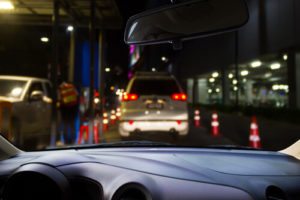The story behind DUI roadblocks is interesting from a legal perspective. A DUI roadblock or “sobriety checkpoint” is a roadblock set up by law enforcement officers to catch potential DUI suspects. These checkpoints are set up at busy intersections in the hopes of taking drunk drivers off the streets. However, time and time again they are also used to fine law-abiding citizens for minor traffic offenses. In addition, these checkpoints yield very few DUI arrests when contrasted with the number of innocent drivers stopped. Since they are conducted at random, they are widely considered a violation of Fourth Amendment protections against searches and seizures.
Michigan Department of State Police v. Sitz
In 1986, the Michigan State Police Department set up a DUI checkpoint that sparked a major lawsuit. Several drivers arrested for DUI at the time of the roadblock sued the state for violating their Fourth Amendment rights. They reasoned that their arrests were unconstitutional since the circumstances leading up to them met the definition of “unreasonable search and seizure.” The Michigan Supreme Court sided with the defendants, agreeing that the stop had violated their rights; however, in 1990, the US Supreme Court overturned the decision.
In a 6-3 ruling the federal court overruled the Michigan Court’s decision, finding the highway sobriety checkpoint program consistent with the Fourth Amendment, despite its intrusive nature. Although the Court recognized that roadblocks meet the definition of an “unreasonable seizure” it found that the threat of a drunk driver justified the intrusion as a necessary means of protection.
The Supreme Court held that Michigan had a “substantial government interest” to reduce drunk driving fatalities and that pursuing this through DUI checkpoints was a rational method of achieving that goal. Only two Justices dissented, citing various elements of a DUI sobriety checkpoint that clearly violate the Fourth Amendment.
Most States Stand By DUI Checkpoints
Based on the Supreme Court’s decision, DUI checkpoints are legal; however, it is up to individual states to decide whether law enforcement officers may use these checkpoints to apprehend DUI suspects. After the ruling in Michigan Department of State Police v. Sitz, 39 states consider DUI checkpoints constitutional. Only 11 states passed laws to prohibit these roadblocks including Alaska, Idaho, Iowa, Michigan, Minnesota, Oregon, Rhode Island, Texas, Washington, Wisconsin, and Wyoming.
Consequences of an Unexpected DUI Arrest
A DUI is a misdemeanor offense that brings significant penalties. You may face the following upon your first DUI:
- License suspension
- Up to one year in jail
- Fines of up to $500
- Fines of up to $1000 for a BAC at or above 0.15%
- Up to one year of probation
- Community service
Harsher consequences may ensue if your DUI led to an injury or death. It’s crucial to have a knowledgeable DUI lawyer protect your interests as soon as possible after an arrest, as it may be possible to enter a diversion program and avoid the worst possible penalties.
Seek Strong DUI Representation in West Palm Beach
DUI checkpoints are common in major Florida cities, particularly around big holidays. You may expect to run into such a checkpoint during the Fourth of July, New Year’s Eve, and even Thanksgiving weekend. These roadblocks are typically conducted at night when it is more likely that people have been drinking. A skilled DUI attorney in West Palm Beach can research the facts of a case to select an appropriate defense strategy for anyone arrested for DUI at a sobriety checkpoint. Brian Gabriel of The Law Office of Gabriel & Gabriel holds over 30 years’ of experience defending DUI throughout South Florida. Call 561-622-5575 or complete a contact form for a free and confidential case evaluation.


